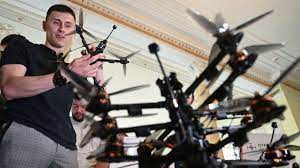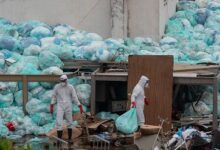
Drones have had a profound effect on the war in Ukraine used in great quantities by both sides. China’s move to place restrictions on exports, however, has led to concerns that there could be a problem with supplies.
Many of them are commercially made in China and bought off the shelf, and new supplies are vital because of the large numbers lost in the fighting.
But there are indications of a reduction in the number of Chinese drones and parts available to both Ukraine and Russia.
According to the Royal United Services Institute (Rusi), a London-based think tank, Ukraine is losing about 10,000 drones a month.
Numerous volunteer groups have been instrumental in using donated funds to help the Ukrainian army restock its supplies.
Commercial drones are used alongside purpose-made military designs, such as Turkish Bayraktar drones used by Ukraine and Iranian Shaheds used by Russia.
The latest restrictions imposed by the Chinese government came into force on September 1. They apply to longer-range drones weighing more than 4kg, as well as drone-related equipment such as some cameras and radio modules.
Chinese producers of such equipment are now required to apply for export licences and provide end-user certificates, and the government in Beijing – which has not condemned Russia’s invasion of Ukraine – says commercial Chinese drones must not be used for military purposes.
Ukrainian volunteers and soldiers say the latest Chinese restrictions have so far had minimal impact on the availability of drones, especially the ubiquitous lightweight Mavics made by the Chinese company DJI.
However, they say that the supply of parts has been affected, and they also fear that the situation may worsen in the future.
“The only change for now is that we’re more actively buying whatever stock is left in European warehouses,” says Lyuba Shypovych, who heads Dignitas, one of the largest Ukrainian volunteer groups supplying the military with drones. “But what we’ll be doing in the future is unclear.”
She is particularly worried about the availability of parts such as thermal imaging cameras.
—BBC






